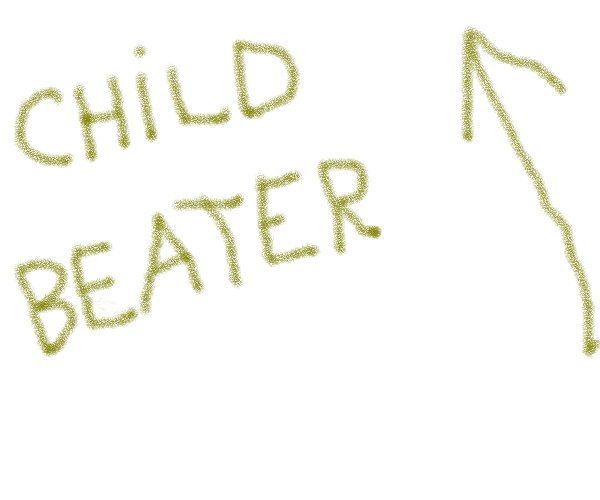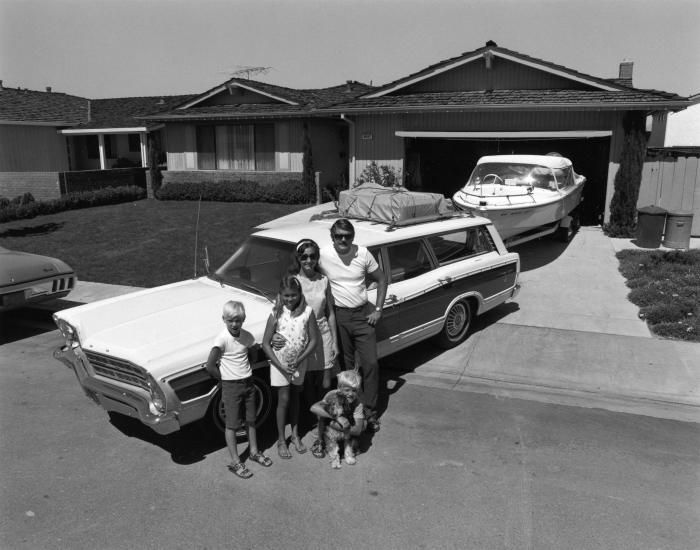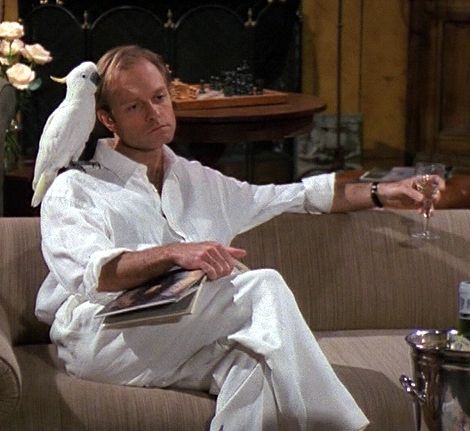One
of my brother's friends and co-writers kept bugging him to “write
what you know about.” This dictum supposedly allows one to truly
put down on paper the depths of your heart and soul.
“Ken,
write about your disease!” He was advised.
My
brother suffered from an Edwardian etiquette that would force him to
put his troubles aside for others, including terminal illness.
Bothering others with your own problems was NOT allowed. If you
want to get a bird's eye view on his personality, think of Niles
Crane from the show Fraiser. That was my brother in spades (minus the cockatoo).
The
following was his final piece before he died and satisfied his friend
about “writing what you know about.”
I
warn you now. What comes gets disgusting, at times sad, bleak and
extremely personal. I read his story at the publishers before it
went to print. I did not know the real depth he
managed to hide the trials he undergone. I knew what crap he had to
deal with but he managed to keep the worst within himself so well.
*****
From
the East Side Monthly/Providence Monthly, December 2003.
Withering Heights
A
kind, gentle creative Spirit Succumbs to Disease.
Ken
Mahan was a talented musician and writer who worked for the past
eight years as a member of the United Way marketing team here on the
East Side, as well as a columnist for this paper but regularly for
our sister publication Providence Monthly. Just this month, Ken lost
his twenty year battle with the debilitating disease known as cystic
fibrosis. What follows is a journal Ken kept to document his final
thoughts, frustrations and hopes during the last few months. Perhaps
one of the kindest and most sensitive individuals many of us have
ever met, Ken's insights and humor remained intact to the end and
despite this harrowing ordeal.
PLEASE
STOP ME FROM DISAPPEARING IN MY OWN CLOTHES!
“Not
again” I whisper in exhaustion, watching gobs of phlegm streaked
heavy with blood sliding around then disappearing down the drain in
the bathroom sink. I had coughed deeply, sending needles of pain
through my inflamed lungs . The blood means my lungs are infected
again. It is a cold morning and I am trying to get myself ready for
work.
I
feel sick, but usually I drag myself through work and other
activities. Sometimes, as a way to keep moving forward, I am
needlessly harsh with myself. I will tell myself that life is about
suffering anyway, and if I feel sick, unhappy and unfulfilled, then
the least I can do is to keep my mouth shut and not burden others
with it. I generally try to avoid the subject of my illness
altogether, unless I am cornered into talking about it. I am often
fearful that over time I would just sound like someone who complains
too much.
Alone
in the kitchen, with the sunlight glaring at me through the window, I
feel like crying as I open the prescription bottles of antibiotics.
I am so tired of taking them repeatedly for weeks on end. The Cipro
and Dicloxacilin eventually control the infection, but in the
meantime, they give me fatigue, diarrhea and nausea. I can sense the
antibiotics while they are in my system. I feel like I've been
lowered into a vat and immersed in some kind of nagging chemicals
that put my in a wearing state of suspense, making me tired but not
letting me sleep peacefully.
I
am thin. A side effect of the antibiotics is that sometimes food
seems unpalatable. A ham sandwich tastes like it has gone bad, while
a meatball sub has a very strong taste of iron. I feel less inclined
to eat, and I lose weight. On this particular day, I am five foot
ten and 117 pounds. In a mirror, my arms are slender and, I have to
admit, more feminine looking than masculine. My stomach is flat and
the outline of my ribcage is easily visible. I feel ashamed.
There
are enzyme pills I take to help my body absorb nutrients. Each day, I
am supposed to take 30 of them with each meal or snack. As I walk
toward the bathroom, I am seized by a coughing fit and I have to stop
until it passes. Staircases and hills make me huff and puff from
shortness of breath.
I
fear my physical life is becoming increasingly restricted. Several of
my neighbors are elderly people; they walk slowly, their movements
are gentle, and their presence suggests a kind fragility. Although I
am just 44, I feel at times that I am prematurely turning into one of
them.
At
times, the stress of chronic sickness seems to reduce me to a small
boy who understandably wants to be comforted, and who cannot fathom
why he is continually being punished. Illness can make you earnestly
hope that there indeed is a merciful God who hears you and might
deliver you from suffering. A protracted illness also tends to put
pressure on whatever your particular neurosis might be, in my case,
tendencies toward unfair self criticism and depression. It often
takes a concerted effort to keep those destructive urges at bay.
On
some very trying days, however, when the illness has been wearing on
me, I sometimes slide into tormenting myself with thoughts of
shameful inadequacy. An unassuming, mild-mannered man, I worry that
I am merely timid, weak, fearful, and have accomplished little in
life. Looking back, I tend to dismiss the good things I have done as
inconsequential, and instead I see many instances of procrastination,
negative thinking, getting discouraged, and not doing enough to fight
back against my fears.
Friends
meanwhile seem to lead more full, healthier lives, they ask for what
they want, they work through their fears, they achieve goals, and
they find a reasonable degree of happiness. When illness has
exhausted me physically and depression has gotten the better of me
for a time, I want to lay my head on someone's shoulder and say,
“Please, I don't want to be sick anymore. If I did anything wrong
or I'm just a failure, I'm so sorry. I didn't mean to be. I never
wanted to hurt anybody, or bother anyone. I am so sorry for being
what I am, but please let me not be sick anymore. Please let me stop
coughing. Please let me stop gasping for air. Please make my chest
stop hurting. Please stop me from disappearing in my own clothes.”
I
breathe in and out quickly, trying to get enough air. My chest rises
and falls. I sit on the bed and try to calm myself. I see the red
digits on the clock. In a few minutes, I will have to drive to work.
When
I arrive at the workplace, I park my car. Taking small steps as I
cross the parking lot, I hope that none of my co-workers will appear
and want to chat with me as we walk inside, because I can barely
talk. Once inside, I lean on a railing for a few minutes. I get to
my desk finally and I collapse into my chair. I am momentarily
relieved, but I did not know that things were about to take a turn
for the worse.
SERVING
TIME IN SOLITARY
We
all expect some suffering in life, whether it is a physical ailment
like a sprained ankle or external difficulty like a broken window.
There is pain or hardship, some application or remedy, and then
relief and a reassuring sense of having some control over one's
destiny. Chronic illness, however, does not relent, and can begin to
feel like a life sentence imposed for some terrible personal flaw or
wrongdoing. Not being able to get enough air is a panicky,
frightening feeling, and it is particularly so when you are isolated,
far from friends and familiar things. In that hierarchy of human
needs, being deprived of air trumps any other concern. Air must be
restored.
One
afternoon while walking along Hope Street in Providence, for no
apparent reason, I could not seem to inhale. I felt that the hand of
God had reached down from the sky to block my windpipe. In the
midst of that calm, pleasant, languid summer day, people meandered on
Hope, drove their cars, and went about their proverbial business
unaware that the slender middle-aged man with the dark blond hair
and the blue eyes was strangling to death in the middle of the
sidewalk.
After
some coughing, I got some air finally. With some other interruptions
of shortness of breath, it took me an hour to take a 30 minute walk.
I thought about calling someone to give me a ride, but felt too
ridiculous. “Listen, if you're not too busy, could you give me a
ride for about three blocks? Otherwise it's going to take me the rest
of my life to get to Rochambeau Ave.”
Another
day at home, some phlegm is stuck in my chest and I try to cough it
out, but it seems intractable. As I continue to cough, my chest
begins to feel inflamed; each additional cough feels like quick slash
of a razor. Suddenly my face is terribly warm, I seem to be just
barely getting enough air, and I am very scared. I wonder if I
should call 911. In a way, what scares me the most is that I am
alone, with no soothing voice near or hand gently clasping mine. I
would never want to die like this, by myself in an empty house. I
wonder if I should call a friend, if just the sound of a concerned,
familiar voice would calm me. I finally try a dose of Pulmozyme, a
mucus thinning aerosol that is used in a nebulizer, a small air
compressor that turns liquid drugs into a vapor I can use. At first,
I can barely inhale it. My heart is beating quickly.
It's
getting better now, it's getting better now. I gently repeat in my
mind, hoping to make it come true. Shortly, I manage to cough out
the phlegm. The coughing can be a terrible paradox. My body induces
spastic coughing fits because it is trying to expel the junk in my
lungs, but the coughing itself, which goes outward, makes it
difficult to inhale, and I frantically suck bits of air between
coughs. I involuntary jerk back and forth, as some demon takes
possession of my body.
A
MERE BAGEL
Lately,
I cannot seem to walk very far without pausing to rest and catch my
breath. I had often had trouble hauling myself up inclines and
hills, but this is happening now in my office or on a level sidewalk,
places where it should be fairly easy to walk.
The
Daily Bread Cafe is just over a block away from my workplace at
United Way, the corner of Wayland and Waterman. I cannot make the
distance anymore without stopping. I have certain strategic points I
use. On the corner of Medway street is a public trash can on which I
can lean on for a few minutes, odd as it may look to a passerby. A
funeral home has a nice low stone wall where I can sit. I suppose
from a certain point of view, there is something ironic about
frequenting the funeral home like it is some kind of idyllic park
bench on Blackstone Blvd.
One
cold, raw day, I made the trudge to Daily Bread with great
difficulty. The weather was foul, but I felt the need to escape, at
least temporarily the office's sterile cubicles, hallways, and
fluorescent lights. Thus I braved the raging elements in quest of a
bagel or muffin. My breathing was labored as I walked through the
cold little bullets of rain and endless wind. A mere bagel seems
hardly worth the stress of this simple outing is giving me, but for
years I have dragged myself forward, perhaps desperately than
doggedly, and I am afraid that if I relent I will somehow finally
lose control of my life.
When
I arrive at the cafe, I enter, relieved to be in it's warm, cozy
environs, but as I look at the staff behind the counter, I realize
that I am so out of breath that I cannot talk. For the moment, I sit
at a nearby table to collect myself. I am breathing heavily, my
jacket is slick and sagging with cold dampness. My eyes are
watering. On my table I have nothing, of course, because I haven't
ordered anything.
“Here,
take this,” says a man about 40 years old. He drops a dollar on
the table in front of me. “Get yourself a cup of coffee,” he
says helpfully.
Because
of my haggard appearance, he thinks I am a homeless man. After being
confused for a moment, I hand the dollar back to him. “No, no, I
have money,” I say. He believes me and accepts it.
I
live in a modest suburban home in Pawtucket. I am far from homeless,
but apparently I can look pale, gaunt and distraught enough to cause
someone to think that I am homeless. When I finally calm down, I
order my damned bagel.
THE
SMOKING GUN
I
was not diagnosed with cystic fibrosis until I was 25, which is
unusual in that most people are diagnosed as children. As a youth,
my symptoms were perhaps not as pronounced, or they were dismissed as
the usual cycle of colds and flu that children experience. I
forever, though, seemed to have colds.
Years
later, my mother told me that a pediatrician had suspected I had
respiratory problems and told her and my father to take me to a
specialist, presumably a pulmonary doctor. They chose not to do so,
and when I asked my mother why they made this decision. “I don't
know,” she said.
“You
don't know?” I asked incredulously. “What do you mean, you don't
know?”
“I
don't know” she responded.
I
was not angry or upset, but I was perplexed. Perhaps they feared a
specialist was too much money.
Whatever
concerns my parents may have had about respiratory problems, vanished
into the thin air, it seemed, as they proceeded to turn our house in
the 1960's into a veritable gas chamber with cigarette smoke.
Sitting at the kitchen table each night, my parents puffed on
Newports, their carcinogen delivery system of choice. They struck
matches from cardboard matchbooks with cheerful little advertisements
for the Old Stone Bank and the Checker Club restaurant. The matches
flared, then gave a hot, bright orange glow to the end of a fresh
cigarette. Stinking ashtrays were chock full of butts and dirty
ashes. I recall one ashtray that was sculpted in the likeness of a
lovely, yellow flower. It seemed strange to me to make something so
nice for the express purpose of defiling it with disgusting cigarette
butts, the filter ends damp with saliva.
As
the plumes of smoke rose and turned lazily, the kitchen ceiling
gradually took on a sick, brownish hue. In summer, some clean air
came through the screen door, but in the predominately cold New
England weather, our doors and windows were naturally closed most of
the time, trapping the smoke, and encouraging it to creep around the
walls and the ceilings like malevolent, wispy vipers.
This
was the air I breathed for years. Second hand smoke was my constant
companion. Once again, I am not so much angry now, but saddened that
everyone's health was compromised for the sake of sucking on several
thousand cigarettes over the course of however many years my parents
did so. To be fair, I am really not sure if the smoking had that
much effect on my lungs, but it certainly could not have helped
matters.
I
am sure of some other things, however. Every morning, my father
would awaken and launch into a hacking cough that you could hear up
and down the our street. This is no joke as my childhood friends tell
me they could hear it. He was an executive at a savings and loan,
and in his considered medical opinion, he did not have a problem with
smoking. He attributed his orgy of coughing to a dreaded condition
known as “post nasal drip,” i.e. mucous moving from the sinuses
the back of the throat. They only treatment for post nasal drip was
Dristan, an over the counter drug always at the ready in our medicine
cabinet. All the Dristan in the world, however, did not seem to stem
that morning ritual of labored, ragged and sharp coughing fits.
When
I worked briefly at the savings and loan as a teenager, I saw he had
a good sized mound of cigarette butts on his desk as well. It seemed
the only time he did not smoke was when he was asleep. Perhaps even
then he dreamed pleasantly about lighting a Newport and taking a
nice, long drag.
At
46, my father developed pneumonia, slumped then crashed onto our
kitchen table with the stained ceiling above him and died on a bleak
February day. As a teenager, I did not appreciate the thought that
46 is far too young to die like that.
At
65, my mother, though she had finally quit smoking a few years
earlier, developed emphysema, a painful constriction of the airways
that keeps you from exerting yourself for lack of air. It is a slow,
maddening disease. Watching someone die from emphysema is like
witnessing a crucifixion. The person is still alive, clinging to
live, but you know it is simply a matter of grueling time before the
inevitable occurs. She was bed ridden and had hospice care for about
a month, until she, too, died on a bleak day in February.
It
is not unusual to bury your parents, on the contrary, it would seem
the natural order of things, but there is something disturbing about
watching them die unnecessarily from a mundane vice. I am
fortunate, I do not smoke, not because I have some great moral
rectitude that forbids it, rather because I do not like it. Perhaps
I got enough of it as a child. Nowadays it does not seem exotic or
hip to me. I never preach at anyone, but when I see smokers, I feel
the urge to ask them if they ever imagined what it is like to be
gasping for air in a hospital bed. I meanwhile at 44 am wrestling
with what I have been told is end-stage cystic fibrosis. Perhaps it
is stubborn denial, but somehow I still think I will live for years,
in spit of what my doctor calls the “disease process,” i.e. the
gradual damage happening to my lungs as infections occur. It would
be nice to get past 46 and at least outlive my father, so to speak.
MUCOUS
WAS MY FRIEND
On
a practical level, cystic fibrosis is all about living with mucous
and lots of it. There is an ongoing need to expel it, a need that
becomes particularly crucial when an infection causes even more
mucous to accumulate, threatening to block your ability to inhale
air. As a youth, long before I knew I had cystic fibrosis, mucous
was my friend, one might say, a sort of amusing plaything.
During
a certain phase of their development, spitting is extremely important
to boys, either as an act of aggression, a way to mark territory or
some odd attempt to look cool. It is not uncommon for boys to have
spitting contests for distance, or to while away the hours spitting
at a wall. Because my mucous was unnaturally thick, it had more mass
and was easier to pitch forward with greater force for longer
distances. It is easier to throw a golf ball than a cotton ball
because the golf ball has greater mass. Due to this scientific
principle, I was able to distinguish myself by employing my mucous as
a weapon of sorts, inhaling deeply and blasting the gobs as far as
possible. There was also a small thrill when the gunk would land
with an actual audible slap against a wall or other surface, during
that blissful period in a boy's life when anything gross and
disgusting could not be more enjoyable. The other boy's mere saliva
was paltry in competition to my mucous. They spat a few feet while I
launched veritable intercontinental ballistic missiles that cruised
through the air for an appreciable time before it splattered with
great effect on the pavement.
According
to a sort of unwritten Geneva Convention, we did not spit on each
other generally, but wherever there are weapons, of course, things
can unexpectedly go awry. One afternoon at our neighborhood hangout
at a substation behind a shopping plaza, most of the gang were not
present. It was only myself and Ellen Harris. We were not
particularly found of one another, nor were we very mature about
dealing with the opposite sex. Ellen stood sullenly on one side of
the substation and I on the other, unable to see her. After a while,
out of sheer boredom, I decided to see how far I could spit straight
up into the air. With a hearty thrust, I blasted a glob of mucous
surprisingly high into the air. Rather than go straight up and down,
however, it rather described a parabolic arch, hurtling downward
toward the other side of the substation. A heart rending scream
rang out. Ellen had been hit. She might have cried “Medic!”
Instead asserted angrily, “I'm going to get my brother to kick your
ass!” For my own part, I was initially horrified, but then rapidly
the humor of the episode overtook everything and I laughed.
Fortunately, Ellen never made good on her threat, or perhaps her
brother did not think spitting on his sister was any great
infraction.
FOLLWING
DOCTORS ORDERS
The
staff at the cystic fibrosis clinic at Rhode Island Hospital are very
patient and helpful. Dr. Donat is very knowledgeable, thorough man
with a slightly whimsical bedside manner. Pam, a nurse, is very
efficient and kind-hearted. Stephanie is a nutritionist and has a
charming German accent. She quietly radiates iron will.
“You
will have peanut butter and crackers for a mid-afternoon snack, yes?”
Replying
anything other than “yes” to her seems unthinkable.
Their
initial assessment is that I need to gain weight and follow a regimen
of medications so as to make myself a good candidate for a lung
transplant. Cystic fibrosis is making my lungs deteriorate. I very
much hope to get a lung transplant. They give me loads of
milkshakes, vitamins and enzymes to get me stared.
I
did well at first, but there is a very old saying, “The spirit is
willing but Kenneth R. Mahan is weak” or something to that effect.
Partly out of sloth and partly depression, my compliance with the
regimen became inconsistent.
At
the same time, the pronounced fatigue that was making me cling to
trash cans on my way to the Daily Bread was getting worse. At my
desk at work, it was difficult to hold my head up. I would retreat
to a men's room that had a small couch and sit with my head in my
hands, wondering how I could be continually be so tired. Moving
around the office, I kept an eye out for empty chairs where I could
sit and collect myself before making that final 75 foot trek back to
my desk.
I
went to see my doctor, unsure if he could really do anything about
this problem. To my surprise, he quickly concluded that the time had
come to put me on oxygen 24 hours a day. I was perpetually tired
simply because my lungs, damaged by years of infections and
pneumonias, were no longer absorbing enough oxygen from the ordinary
air. For the foreseeable future, I would be unable to work.
I
look at the cool, grey sky, my lungs burning and I beg forgiveness,
for a chance to redeem myself and end the roiling pain in my chest.
Ken
died several days later, on December 18th, leaving behind
an army of friends and writing colleagues.
*****
The
last time I read this article was nine years ago. I found it the
other day while digging through a drawer fishing for some batteries. Once
again, perspective rears it's wise head. As I re-read this, I didn't
think of Ken, but of myself. Aren't I a selfish bastard? The person I was then, nine years ago,
is a bit different than the one today. It's been nine years, so this story of his reads different to me.
You get older, you learn about yourself more and more. There is a clarity that comes with age and it advances always. Though in my case, I tend to need certain mileposts to make me aware, like the re-read of the the story above.







